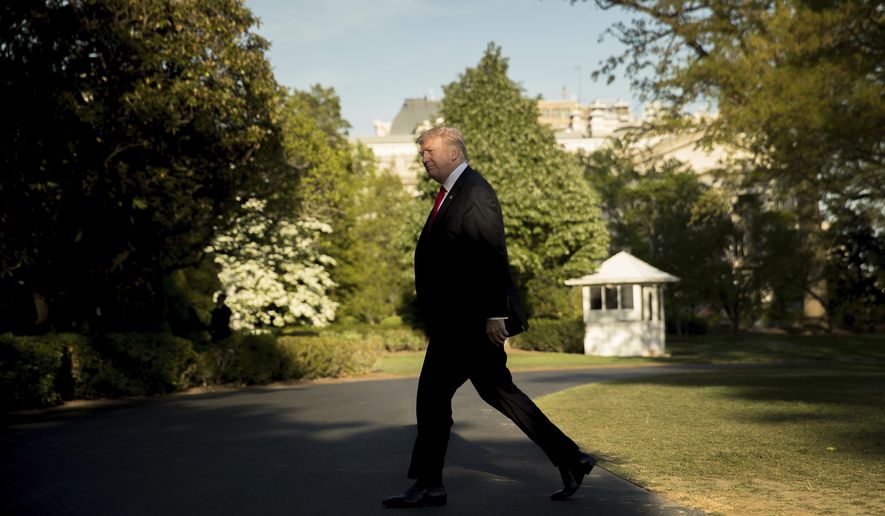White House officials say they will provide guidance to federal agencies Friday on contingency plans for a potential government shutdown, a week before the April 28 deadline for Congress to pass a spending bill and keep the lights on.
President Trump’s Office of Management and Budget is sticking to the protocols laid out by the Obama administration in a 916-page budget circular from July 2016, which spells out the steps to take in preparation for shuttering the government.
It remained uncertain Wednesday whether they’ll take a different tack than President Obama, who was accusing in the 2013 federal shutdown of making it as painful as possible on citizens to gain leverage in a budget battle with Republicans over Obamacare.
Shutdown moves by the Obama administration in 2013 that provoked complaints included erecting barricades to keep people out of the outdoor World War II Memorial and Vietnam War Memorial in Washington.
“One week prior to the expiration of appropriations bills, regardless of whether the enactment of appropriations appears imminent, OMB will convene a meeting or teleconference with agency senior officials to remind agencies of their responsibilities to review and update orderly shutdown plans,” reads the Obama administration document being used by the Trump administration.
Several departments and agencies contacted by The Washington Times, including State, Interior, Commerce and the EPA, declined to reveal plans or whether they would differ from those of the Obama administration.
Budget negotiators have repeatedly voiced optimism that they can reach a deal, but several hot-button issues remain unresolved and many of Mr. Trump’s priorities are on the chopping block.
House Speaker Paul D. Ryan, Wisconsin Republican, has said the funding for a wall on the U.S. border with Mexico likely will be left out, one of Mr. Trump’s top campaign promises.
Funding for the wall and other of Mr. Trump’s priorities, however, could be achieved in the budget for the next fiscal year that begins Oct. 1.
Still, the standoff puts in jeopardy several other of Mr. Trump’s campaign promises in the funding package that will cover the remaining six months of the current fiscal year that ends Sept. 30. His push to slash domestic spending and boost military spending, and his promise to defund Planned Parenthood, to rein in the Consumer Financial Protection Bureau and to punish sanctuary cities are all on the bargaining table.
The negotiations between House and Senate appropriators have been ongoing during Congress’ spring break. But the deadline hits just four days after lawmakers return Tuesday to the Capitol.
A major sticking point is critical Obamacare “cost sharing” payments to insurers. Mr. Trump has threatened to end the payments, which would put the health care law into a death spiral unless Democrats agree to negotiate major reforms to Obamacare.
The cost-sharing payments, which totaled about $7 billion last year, are critical to the survival of Obamacare. Without the payments, plans would likely drop out or raise their premiums across the board.
A federal court invalidated the payments, saying the Obama administration spent the money even though Congress specifically stripped the funds from its annual spending bills. The Obama administration nevertheless continued to distribute the funds while the case is appealed.
If Congress puts the money into the new spending bill, it likely would spell victory for the appeal by Obamacare supporters, removing the underpinning of the original ruling.
Senate Minority Leader Charles E. Schumer sounded optimistic this week that he’ll be able to get the money included.
“We’re working hard to get it in the bill and we’re very hopeful. Negotiations seem to be going quite well,” the New York Democrat told reporters. “And I’m very hopeful that we can come to an agreement that everyone can be proud of. I’m not going to get into details, but we’re working hard to get that provision in.”
Mr. Trump isn’t showing signs of backing down.
America’s Health Insurance Plans, the lobby representing health insurance companies, and representatives from major insurance companies had a sit-down Wednesday with Seema Verma, the administrator of the Centers for Medicare and Medicaid Services, to press that their top concern was cost sharing payments.
Coming out of the meeting, however, administration officials refused to tip their hand either way or give the insurance executives and lobbyists the assurances they wanted.
• Tom Howell Jr. contributed to this report.
• S.A. Miller can be reached at smiller@washingtontimes.com.




Please read our comment policy before commenting.